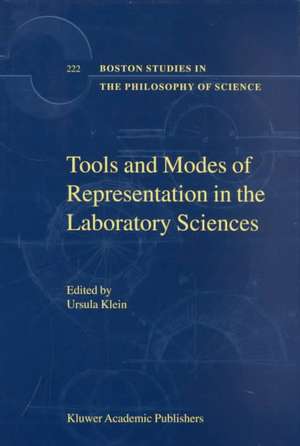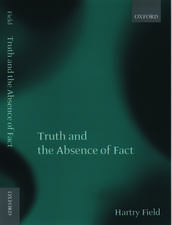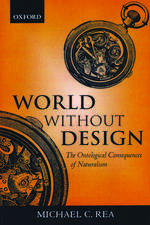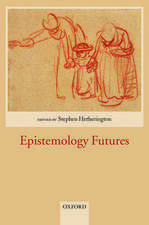Tools and Modes of Representation in the Laboratory Sciences: Boston Studies in the Philosophy and History of Science, cartea 222
Editat de U. Kleinen Limba Engleză Hardback – 31 oct 2001
| Toate formatele și edițiile | Preț | Express |
|---|---|---|
| Paperback (1) | 559.88 lei 38-44 zile | |
| SPRINGER NETHERLANDS – 15 dec 2010 | 559.88 lei 38-44 zile | |
| Hardback (1) | 645.47 lei 6-8 săpt. | |
| SPRINGER NETHERLANDS – 31 oct 2001 | 645.47 lei 6-8 săpt. |
Din seria Boston Studies in the Philosophy and History of Science
- 18%
 Preț: 944.19 lei
Preț: 944.19 lei - 15%
 Preț: 646.75 lei
Preț: 646.75 lei - 15%
 Preț: 646.75 lei
Preț: 646.75 lei - 15%
 Preț: 699.28 lei
Preț: 699.28 lei - 18%
 Preț: 736.50 lei
Preț: 736.50 lei -
 Preț: 500.02 lei
Preț: 500.02 lei - 15%
 Preț: 643.16 lei
Preț: 643.16 lei - 15%
 Preț: 650.69 lei
Preț: 650.69 lei - 15%
 Preț: 634.18 lei
Preț: 634.18 lei - 15%
 Preț: 642.68 lei
Preț: 642.68 lei -
 Preț: 391.40 lei
Preț: 391.40 lei -
 Preț: 383.33 lei
Preț: 383.33 lei - 18%
 Preț: 944.19 lei
Preț: 944.19 lei - 18%
 Preț: 955.56 lei
Preț: 955.56 lei - 15%
 Preț: 643.65 lei
Preț: 643.65 lei -
 Preț: 392.75 lei
Preț: 392.75 lei - 18%
 Preț: 1229.10 lei
Preț: 1229.10 lei - 18%
 Preț: 1238.23 lei
Preț: 1238.23 lei - 18%
 Preț: 951.29 lei
Preț: 951.29 lei - 18%
 Preț: 1223.25 lei
Preț: 1223.25 lei - 18%
 Preț: 1225.79 lei
Preț: 1225.79 lei - 18%
 Preț: 1226.42 lei
Preț: 1226.42 lei - 18%
 Preț: 1236.82 lei
Preț: 1236.82 lei - 15%
 Preț: 644.49 lei
Preț: 644.49 lei - 18%
 Preț: 1231.78 lei
Preț: 1231.78 lei - 15%
 Preț: 644.30 lei
Preț: 644.30 lei - 18%
 Preț: 957.62 lei
Preț: 957.62 lei - 18%
 Preț: 1222.49 lei
Preț: 1222.49 lei - 18%
 Preț: 947.50 lei
Preț: 947.50 lei - 18%
 Preț: 1833.95 lei
Preț: 1833.95 lei - 18%
 Preț: 1227.99 lei
Preț: 1227.99 lei - 18%
 Preț: 947.35 lei
Preț: 947.35 lei
Preț: 645.47 lei
Preț vechi: 759.37 lei
-15% Nou
Puncte Express: 968
Preț estimativ în valută:
123.55€ • 134.25$ • 103.85£
123.55€ • 134.25$ • 103.85£
Carte tipărită la comandă
Livrare economică 21 aprilie-05 mai
Preluare comenzi: 021 569.72.76
Specificații
ISBN-13: 9781402001000
ISBN-10: 1402001002
Pagini: 284
Ilustrații: XVI, 264 p.
Dimensiuni: 156 x 234 x 21 mm
Greutate: 0.56 kg
Ediția:2002
Editura: SPRINGER NETHERLANDS
Colecția Springer
Seria Boston Studies in the Philosophy and History of Science
Locul publicării:Dordrecht, Netherlands
ISBN-10: 1402001002
Pagini: 284
Ilustrații: XVI, 264 p.
Dimensiuni: 156 x 234 x 21 mm
Greutate: 0.56 kg
Ediția:2002
Editura: SPRINGER NETHERLANDS
Colecția Springer
Seria Boston Studies in the Philosophy and History of Science
Locul publicării:Dordrecht, Netherlands
Public țintă
ResearchCuprins
1. Chemical Atomism and the Evolution of Chemical Theory in the Nineteenth Century.- 2. The Creative Power of Paper Tools in Early Nineteenth-Century Chemistry.- 3. An Early History of Alexander Crum Brown’s Graphical Formulas.- 4. Conventionalities in Formula Writing.- 5. Paper Tools and Fictional Worlds: Prediction, Synthesis and Auxiliary Hypotheses in Chemistry.- 6. Aspects of Paper Tools in the Industrial-Academic Context: Constitutions and Structures of Aniline Dyes, 1860–1880.- 7. Molecular Models and the Articulation of Structural Constraints in Chemistry.- 8. Paper Tools and Molecular Architecture in the Chemistry of Linus Pauling.- 9. Graphic Representations of the Periodic System of Chemical Elements.- 10. The Periodic Table: The Ultimate Paper Tool in Chemistry.- 11. A Principle Written in Diagrams: The Aufbau Principle for Molecules and Its Visual Representations, 1927–1932.- 12. Fedoroff’s Translation of McClintock: The Uses of Chemistry in the Reorganization of Genetics.- 13. Mathematics, Representation and Molecular Structure.- 14. Affinity, Additivity and the Reification of the Bond.
Recenzii
`I can recommend this book to those chemists who would like to catch up on what scholarship has transpired among historians and philosophers of science these past 20-30 years.'
Bulletin for the History of Chemistry, 28:2 (2003)
Bulletin for the History of Chemistry, 28:2 (2003)
Caracteristici
Includes supplementary material: sn.pub/extras


















